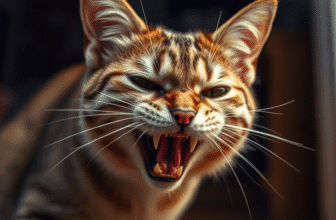
Table of Contents
As a devoted cat parent, recognizing cat symptoms of illness is essential for your cat’s health. Cats instinctively hide their sickness, making it difficult to spot signs of disease, but doing so is crucial for their care.
Signs like vomiting, diarrhea, lethargy, and more can tell you a lot about your cat’s health. Knowing how to spot these signs early can help a lot. It also helps you understand why cats hide their sickness.
Regular vet visits and watching your cat closely are important. Look at their behavior, grooming, and litter box use. This helps catch problems early. Remember, taking care of your cat is a team effort. By staying alert and proactive, you can make sure your cat gets the care they need.
Understanding Why Cats Hide Their Illness
Cats hide their sickness because it’s in their nature. This behavior helps them survive in the wild. They don’t want to show weakness, which could attract predators.
This makes it hard for owners to notice when their cat is sick. They might not see the early signs of health problems.
Evolutionary Instincts and Survival Mechanisms
Fear can make cats hide, but they usually come out in a few hours. Pain is another reason, causing them to hide under furniture or in closets. They hide to avoid being seen and to recover safely.
The Importance of Early Detection
It’s key to notice small changes in a cat’s behavior and looks. Sick cats often become quiet and withdrawn. This can delay getting help.
Regular vet visits are important. They help catch small problems before they get big.
When Subtle Changes Matter
Small changes in a cat’s looks, energy, and how they act can mean they’re sick. Watching your cat closely and getting vet help early can help a lot.
“Cats are masters at hiding illness, which is a survival instinct. As a result, owners need to be vigilant in observing their cat’s behavior and appearance for any subtle changes that could signal a health problem.”
Changes in Appetite and Thirst Patterns
As pet owners, it’s important to watch for changes in your cat’s eating and drinking habits. These changes can be early signs of health problems. If your cat is not eating or drinking right, it’s crucial to act fast to help them feel better.
Not eating for more than 24 hours is a serious sign that needs immediate attention. It can lead to a dangerous condition called hepatic lipidosis. On the other hand, eating too much might mean your cat has hyperthyroidism or another metabolic issue. Drinking too much water could be a sign of kidney disease, liver problems, or diabetes. Drinking less water might mean your cat has a urinary tract problem or is dehydrated.
Watching how much your cat eats and drinks is key to catching health problems early. If you notice big changes, like eating or drinking more or less, don’t ignore it. Taking your cat to the vet quickly can help find the cause and treat it, keeping your cat healthy and happy.
| Symptom | Possible Cause |
|---|---|
| Loss of appetite | Hepatic lipidosis, gastrointestinal issues, pain, or illness |
| Increased appetite | Hyperthyroidism, diabetes, or other metabolic disorders |
| Excessive thirst | Kidney disease, liver problems, or diabetes mellitus |
| Decreased water intake | Urinary tract issues or dehydration |
Keeping an eye on your cat’s eating and drinking habits is important. It helps you spot health problems early. This way, you can get your cat the help they need quickly, ensuring they stay healthy and happy.
Behavioral and Social Changes in Sick Cats
When a cat gets sick, they might act differently. It’s important for owners to notice these changes. They can tell a lot about the cat’s health.
Withdrawal and Hiding Behaviors
Sick cats often hide more than usual. They might hide under furniture or in quiet spots. This is because they’re trying to avoid predators and save energy.
This hiding can be a sign of illness. Owners should pay attention to it.
Changes in Sleep Patterns
Sick cats can sleep differently too. Some might be more active at night, like cats with hyperthyroidism. Others might sleep a lot during the day if they’re in pain.
This change in sleep can mean they’re not feeling well. It’s a sign they might need to see a vet.
Unusual Aggression or Affection
Sick cats might act differently around people. Some might be more aggressive or clingy. This can be because they’re in pain or just need comfort.
Noticing these changes can help owners take care of their sick cats. By paying attention, they can help their cats feel better.
Common Cat Symptoms of Illness to Watch For
As a responsible pet owner, knowing the signs your cat is sick is key. Some signs your cat is sick might not be clear until they’re very unwell. Catching these early can help get them the care they need quickly.
Look out for changes in how much your cat eats and drinks, their litter box habits, grooming, and how they sound. Physical signs like vomiting, diarrhea, being very tired, losing or gaining weight, and changes in their coat, eyes, or gums are also important. These can all mean there’s a health problem.
Respiratory issues, like coughing or hard breathing, need vet care right away. They could be signs of a serious problem. Cats might also act differently, like being more aggressive, withdrawn, or sleeping a lot. This could mean they’re not feeling well.
| Symptom | Possible Cause |
|---|---|
| Constricted or dilated pupils | Eye infection, neurological disorder, or pain |
| Vomiting or diarrhea | Gastrointestinal issues, such as inflammatory bowel disease or pancreatitis |
| Sudden mood changes | Stress, pain, or underlying medical condition |
| Bad breath | Dental issues, such as periodontal disease or tooth pain |
If your cat is acting strangely or showing symptoms, get them to the vet fast. This can stop problems from getting worse and make sure they get the right treatment.

Litter Box Habits and Urinary Issues
Watching your cat’s litter box habits closely is key to spotting health problems early. Changes in how often they pee, peeing outside the box, and signs of pain while peeing are warning signs. These signs mean your cat might have a health issue that needs vet care fast.
Changes in Urination Frequency
More trips to the litter box could mean kidney disease or diabetes. Less peeing or straining might point to urinary tract issues or blockages. Cats with kidney disease often pee more because their kidneys can’t filter waste well.
Inappropriate Elimination
If your cat starts peeing outside the box, it could be due to health problems or stress. Cats might prefer certain surfaces or textures, leading to peeing in the wrong places. Feline interstitial cystitis, a painful bladder condition, can also make cats avoid the litter box because of the pain it causes.
Signs of Urinary Distress
Blood in the pee, frequent trips to the litter box, or crying while peeing are signs of urinary distress. These signs are especially urgent in male cats. Urethral obstructions, a serious condition, can be life-threatening and need quick treatment to avoid serious problems.
Understanding litter box issues and their possible causes is important for your cat’s health. If you see any changes in your cat’s litter box habits or signs of urinary discomfort, talk to your vet.
| Urinary Issue | Possible Causes | Treatment |
|---|---|---|
| Increased Urination | Kidney disease, diabetes | Medication, dietary changes |
| Decreased Urination/Straining | Urinary tract problems, blockages | Medication, surgery (if blocked) |
| Inappropriate Elimination | Medical issues, stress, litter box aversion | Behavior modification, environmental changes |
| Urinary Distress | Bladder inflammation, urethral obstruction | Immediate veterinary care |
“Addressing litter box issues and understanding the potential underlying causes of urinary problems can help you provide the best care for your feline companion.”
Physical Appearance and Grooming Changes
When cats get sick, their looks and grooming habits can change. A messy, greasy, or unkempt coat is a clear sign. Sick cats often skip their usual grooming, leading to matted fur and a dull coat.
Excessive grooming in one spot might mean skin issues, allergies, or pain. Dehydration can be checked by gently pulling the skin near the shoulder blades. If it doesn’t snap back fast, it’s a sign. Also, if an overweight cat loses weight, it could be a sign of diabetes or hyperthyroidism.
- Messy, greasy, or unkempt coat
- Matted fur and increased shedding
- Dull coat appearance
- Excessive grooming in one area, leading to bald spots or skin irritation
- Slow skin snap-back, indicating dehydration
- Unexplained weight loss or gain

Watching your cat’s grooming and appearance closely can tell you a lot about their health. If you see any worrying changes, it’s crucial to talk to your vet. They can do a full check-up and find the right treatment.
Respiratory and Breathing Problems
Respiratory issues in cats can show up in many ways. They can range from slight breathing changes to serious distress. Knowing the different breathing problems and spotting emergency signs is key. This helps pet owners act fast to help their cats.
Types of Breathing Difficulties
Cats with breathing troubles might breathe shallowly, use their mouths to breathe, or pant a lot. They might also stretch their head and neck to breathe better. Or, they could have trouble sleeping because of their breathing. Sneezing or coughing a lot can also mean they have respiratory issues.
Emergency Warning Signs
- Blue-tinged gums: This can be a sign of poor oxygen circulation and requires immediate veterinary attention.
- Extreme difficulty breathing: Cats struggling to catch their breath or making labored breathing sounds need urgent medical care.
- Open-mouth breathing: Cats that are breathing with their mouths open are experiencing severe respiratory distress and need emergency intervention.
Upper respiratory infections in cats can also cause symptoms like nasal discharge and loss of appetite. Any signs of labored breathing or distress need a quick vet visit.
Many things can cause breathing problems in cats, like viruses and bacteria, or health issues. Early treatment and finding the cause is key to helping them get better.
| Statistic | Percentage |
|---|---|
| Cats exposed to feline herpes virus in their lifetime | Up to 97% |
| Cats with lifelong feline herpes virus infection | Up to 80% |
| Cats periodically shedding feline herpes virus | Up to 45% |
| Cats in small groups infected with feline calicivirus | Approximately 10% |
| Cats in crowded conditions infected with feline calicivirus | Up to 90% |
| Cats with upper respiratory signs carrying Chlamydia felis | Approximately 20% |
| Healthy-looking cats carrying Chlamydia felis | About 3% |
| Cats infected with Cryptococcus neoformans | Approximately 4% |
Respiratory issues in cats are serious and need close watching. By knowing the signs and acting fast, you can help your cat get the care they need.
Digestive System Warning Signs
As pet owners, knowing the signs of digestive problems in cats is key. Cat vomiting and cat diarrhea are clear warnings of health issues.
Not every vomiting is a big deal. But if your cat vomits a lot or for more than two days, see a vet. Blood or bile in the vomit means it’s serious.
Diarrhea is also a red flag. It can cause dehydration if not treated. Watch your cat’s litter box habits for changes in stool frequency or consistency.
Constipation, especially in older cats, can be a sign of health problems. Keep an eye on your cat’s eating and litter box use. This helps catch digestive issues early, preventing bigger problems.
| Digestive Issue | Possible Causes | Recommended Actions |
|---|---|---|
| Vomiting | Hairballs, dietary changes, parasites, infections, chronic conditions | Seek veterinary attention if vomiting is frequent or lasts more than 2 days |
| Diarrhea | Dietary changes, parasites, infections, chronic conditions, stress | Monitor for dehydration and contact your vet if diarrhea persists |
| Constipation | Dehydration, lack of exercise, certain medications, underlying health issues | Consult your veterinarian if constipation is ongoing |
By watching your cat’s digestive health closely, you can spot problems early. This ensures your cat stays happy and healthy.
When to Seek Emergency Veterinary Care
As a responsible cat owner, knowing when your cat needs urgent care is key. Some health issues can wait, but cat emergency symptoms need immediate vet attention. It’s important to act fast.
Signs that mean your cat needs emergency care include trauma, trouble breathing, and pale gums. Also, seizures, inability to walk, and severe bleeding are urgent. Severe pain, unusual body temperature, and long-term loss of appetite are also red flags.
If your cat has been exposed to toxins or shows sudden severe symptoms, seek vet help right away. When to take cat to vet for emergencies is a big decision. Quick action can save your cat’s life.
- Emergency animal hospitals have extended hours or are open when primary care veterinarians are closed.
- There are veterinarians in emergency hospitals specializing in providing emergency care for pets, known as criticalists.
- It is advisable for pet owners to find out the location of the closest emergency animal hospital before an emergency occurs.
- Pets that are the sickest are treated by doctors first in emergency veterinary care.
- The emergency hospital staff recommend calling ahead to verify availability as ER status and hospitalization capacity can change frequently.
If you’re unsure about your cat’s health, always seek professional advice. Contact an emergency vet if you have concerns about your pet’s health and well-being.
Conclusion
Keeping an eye on your cat’s health and behavior is key to catching illness early. Knowing what’s normal for your cat helps you spot small changes. Regular vet visits, a good diet, and preventive care are vital for your cat’s health.
Creating a calm and well-equipped home is also important. This includes clean litter boxes and fresh water. If you’re unsure about your cat’s health, always talk to a vet for expert advice.
Spotting illness in cats is the first step to keeping them healthy and long-lived. Pay attention to changes in appetite, behavior, and grooming. This way, you can get your cat the right medical care on time.
Investing in preventive cat care and keeping your cat’s environment stress-free is crucial. This helps your cat stay happy and healthy for many years.
Being quick to notice and act on signs of illness in cats can greatly improve their health. By being alert and working with your vet, you can ensure your cat gets the care they need. Remember, taking care of your cat’s health is a team effort. With your commitment, your cat can live a long and joyful life.
FAQ About Cat Symptoms of Illness
What are the most common cat symptoms of illness?
Common symptoms include lethargy, vomiting, diarrhea, appetite changes, weight loss, excessive thirst, sneezing, coughing, difficulty breathing, and unusual hiding.
How do cats act when they detect illness?
Cats may become more withdrawn, clingy, or display unusual behaviors like excessive vocalization or hiding. They may also avoid being touched in painful areas.
Will a sick cat get better on its own?
Some minor issues, like mild stomach upset, may resolve on their own. However, persistent or severe symptoms require veterinary attention to avoid complications.
How do cats lay when sick?
Sick cats often adopt a hunched or loaf-like position to ease discomfort. They may also lie on their side if they feel too weak or unwell to sit upright.
Do cats know when they are sick?
Cats have an innate sense of their well-being and may recognize when something is wrong. They often withdraw, avoid activity, or hide to protect themselves.
How to comfort a cat when sick?
Create a quiet, cozy space, provide fresh water and easy-to-digest food, and offer gentle attention. Avoid handling them excessively and consult a vet for proper care.
When should I take my cat to the vet for illness symptoms?
Take your cat to the vet if symptoms persist for more than 24-48 hours, worsen over time, or include severe signs like difficulty breathing, seizures, or extreme lethargy.
Can stress mimic illness symptoms in cats?
Yes, stress can cause symptoms like loss of appetite, vomiting, diarrhea, or excessive grooming. If unsure whether it’s stress or illness, consult a vet.
How can I prevent illness in my cat?
Ensure routine vet checkups, vaccinations, a balanced diet, clean water, and a stress-free environment. Monitor their behavior and address any changes promptly.
Source Links
- 18 Signs That Your Cat Is Sick – https://www.thesprucepets.com/signs-your-cat-is-sick-4165142
- Recognizing the Signs of Illness in Cats | VCA Animal Hospitals – https://vcahospitals.com/know-your-pet/recognizing-signs-of-illness-in-cats
- 10 Warning Signs Your Cat is Sick🐱🚑 – https://bdvets.com/blog/10-warning-signs-your-cat-is-sick
- Cat Behavior 101: Is Cat Hiding Something to Worry About? | Heart + Paw – https://heartandpaw.com/pet-parent-resources/cat-hiding
- How to Tell When a Cat Is Sick – https://www.petmd.com/cat/general-health/how-tell-when-cat-sick
- Why Do Pets Hide When They’re Sick? – Willowbrook Veterinary Clinic – https://willowbrookvetclinic.com/why-do-pets-hide-when-theyre-sick/
- Identifying Signs That Your Cat is Sick or Stressed in 2024 – https://marinavillagevet.com/how-to-tell-if-your-cat-is-sick/
- Why Your Cat’s Eating and Drinking Habits Change – Just Cats Clinic – https://justcatsclinic.com/why-your-cats-eating-and-drinking-habits-change/
- Recognizing the Signs of Illness in Cats | VCA Animal Hospitals – https://vcacanada.com/know-your-pet/recognizing-signs-of-illness-in-cats
- The Behavioral Changes of a Sick Cat – https://patch.com/georgia/snellville/behavioral-changes-sick-cat
- 10 Subtle Signs That Your Cat May Have an Illness – https://catsonlyvc.com/10-subtle-signs-cat-may-illness/
- Hillcrest Animal Hospital – https://www.hillcrestanimals.com/site/blog-memphis-vet/2020/03/12/how-to-tell-if-your-cat-is-sick
- Common Cat Diseases – https://www.aspca.org/pet-care/cat-care/common-cat-diseases
- Litter Box Problems – https://www.aspca.org/pet-care/cat-care/common-cat-behavior-issues/litter-box-problems
- Understanding Cat (Feline) Urinary Issues: Symptoms, Causes, and When to Seek Veterinary Care – https://www.trussvet.com/cat-urinary-issues-symptoms-causes-when-to-seek-veterinary-care/
- Cat Urinary Tract Problems and Infections – https://www.webmd.com/pets/cats/cat-urinary-tract-problems
- Is Your Cat Sick? Recognizing the Signs of Illness in Cats l UrgentVet – https://urgentvet.com/sick-cat-symptoms-signs-of-illness/
- 7 Signs Your Cat May Be Sick That Warrant a Call to the Vet – https://www.7hillsvet.com/services/cats/blog/7-signs-your-cat-may-be-sick-warrant-call-vet
- Respiratory Infections – https://www.vet.cornell.edu/departments-centers-and-institutes/cornell-feline-health-center/health-information/feline-health-topics/respiratory-infections
- Feline Upper Respiratory Infection – https://www.webmd.com/pets/cats/upper-respiratory-infection-cats
- Greenbrier-Springfield Animal Hospital – https://www.gsahvet.com/site/blog/2022/04/25/cat-digestive-problems
- Cat Digestive Problems: Symptoms, Diagnosis, and Treatment | Bond Vet – https://bondvet.com/b/cat-digestive-problems
- When to Seek Emergency Care for your Pet – https://www.vetmed.wisc.edu/when-to-seek-emergency-care-for-your-pet/
- 10 Signs Your Cat is Having a Veterinary Emergency | Anicira – https://anicira.org/resources/10-signs-your-cat-is-having-a-veterinary-emergency/
- How to Know When to Take Your Cat to the Emergency Vet | Veterinary Emergency Group – https://www.veterinaryemergencygroup.com/post/cat-emergency-vet
- Signs and Symptoms that your Cat is Sick in Belle Mead, NJ – Harlingen Veterinary Clinic – https://harlingenveterinaryclinic.com/cat-is-sick/
- Signs and Symptoms that Your Cat is Sick in Franklin, TN | Animal Ark Animal Hospital – https://animalarkanimalhospital.com/blog/cat-is-sick/
- How to Tell if My Cat Is Sick? 24 Vet-Approved Signs – Catster – https://www.catster.com/cat-health-care/how-to-tell-if-cat-is-sick/








[…] But there’s more. Cherry pits can also block your cat’s intestines, which might need emergency surgery. It’s a serious problem that every cat owner should know about to keep their pet safe. […]
[…] as cats are naturally adept at masking pain. However, there are several subtle and not-so-subtle symptoms that may indicate your cat is suffering from this […]